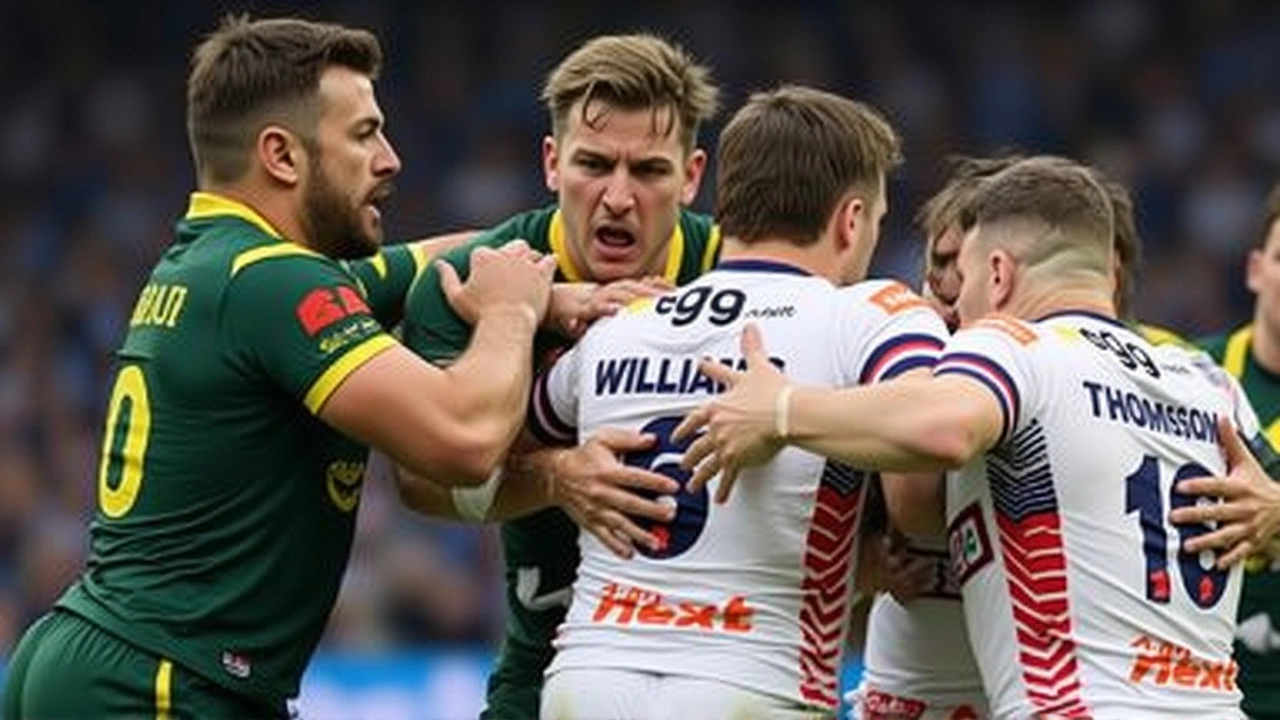Kangaroos Complete 3-0 Ashes Sweep with 30-8 Win in Leeds

The Australian Kangaroos sealed a historic 3-0 sweep of the 2025 ABK Beer Rugby League Ashes SeriesAMT Headingley Stadium with a commanding 30-8 victory over England on Saturday, November 8, 2025, in front of a roaring 19,500-strong crowd in Leeds. The final whistle blew at 9:53 PM UTC, capping off a performance that wasn’t just dominant—it was devastating. Rugby League Ashes had returned after a 22-year absence, and Australia didn’t just show up—they redefined what dominance looks like.
A Decades-Long Dominance, Cemented in Leeds
This wasn’t just another win. It was the 14th consecutive Ashes series triumph for Australia, stretching back to 1970. England haven’t won a series since 1970—55 years without a single series victory. The numbers are staggering: Australia now leads the overall head-to-head 21-19 in series wins since 1908, with 61 match wins to England’s 54. But this 2025 sweep? It felt different. For the first time since the series began, England competed as a standalone nation, not as Great Britain. The weight of history hung heavy over Headingley, and Australia didn’t flinch.
The Match That Broke England’s Spirit
The first half was tense. England, led by captain Kruise Williams, held firm, even scoring a try in the 33rd minute through Williams himself, converted by Harry Smith. But Australia’s defense, disciplined and relentless, absorbed everything. Then came the 62nd minute. Harry Grant, Australia’s dummy half and captain, burst through a gap like a sprinter out of blocks. The try shifted the momentum like a tide turning. The crowd gasped. The scoreboard blinked: 18-8. England’s hopes began to unravel.
Then came Reece Walsh. The fullback, already a star, turned into a nightmare. Two tries in the final 10 minutes—68’ and 78’—each more clinical than the last. His speed wasn’t just fast; it was surgical. Meanwhile, Nathan Cleary was flawless, converting all five Australian tries and adding five penalty goals, racking up 15 points. The final score? 30-8. England’s lone try in the series came in Game 1. That’s how one-sided it was.
Attendance, Atmosphere, and a Return to Glory
The series drew 112,918 fans across three venues. Wembley Stadium in London saw 60,812—a testament to the hype. Then came Hill Dickinson Stadium in Liverpool, packed to its 52,106 limit. But it was Headingley, with its intimate, electric atmosphere, that felt like the emotional climax. Sold out. No empty seats. No quiet corners. Just 19,500 voices screaming as Grant broke through, as Walsh sprinted past defenders, as the final whistle blew and the Kangaroos raised their arms.
Referee Grant Atkins kept control amid multiple melees—especially in the 54th minute when tensions flared after Mike McMeeken spilled the ball near the line. The video referee, Tom Grant from England, had his hands full. But the game never spiraled. It was physical, yes. But clean. And fiercely contested.

Why This Matters Beyond the Scoreline
This wasn’t just about rugby. It was about legacy. The Ashes had been dormant since the 2017 World Cup final, when Australia beat England 6-0. That match felt like an end. This felt like a resurrection. And Australia didn’t just return—they dominated. The series was billed as a revival, but the result confirmed it as a reaffirmation of Australia’s global supremacy in rugby league.
England’s coaching staff remains unnamed in official reports. Australia’s, too. Yet the players spoke louder than any sideline speech. As one Sky Sports commentator put it: “Australia didn’t just win—they reminded everyone they’re the benchmark.”
What’s Next? The Silence After the Storm
There’s no announcement yet on when the next Ashes will be played. No dates. No venues. No plans. That’s the odd thing. After such a high-profile return, after 112,918 fans packed stadiums, after 55 years without a series win for England—why no roadmap? Is this a one-off revival? Or the start of a new era? The silence is deafening.
For England, the path forward is clear: rebuild. Develop depth. Find a coach who can instill belief. For Australia, the challenge is different: don’t let complacency creep in. The next generation—players like Walsh, Grant, Cleary—will soon be the veterans. Who will replace them? The Kangaroos have been the gold standard for over half a century. But standards only stay high if they’re constantly defended.

Historical Context: The Ashes That Never Died
The Rugby League Ashes began in 1908, just months after the first Australian national team toured Britain. It was born from imperial rivalry, then hardened by war, then sustained by pride. Great Britain competed until 2003. Then came the hiatus. For 22 years, the Ashes were a footnote. Until 2025. Now, it’s alive again. And Australia didn’t just win—they made sure the world remembered why.
Frequently Asked Questions
How does this affect England’s chances in future international rugby league?
England’s 3-0 loss, combined with only one try scored across the entire series, exposes a deep talent gap. With no professional domestic league and limited exposure to elite competition, England’s pathway to top-tier rugby league is fragile. Without major investment in grassroots development and a clear coaching structure, future Ashes contests may remain lopsided. The 2025 series was a wake-up call—not just for fans, but for the Rugby Football League.
Why was this the first Ashes series contested by England instead of Great Britain?
Great Britain last competed in the Ashes in 2003, after which the team was disbanded to prioritize national teams from England, Scotland, and Wales. The 2025 series marked the first time England competed as a standalone entity in the Ashes, reflecting a strategic shift toward national identity over a combined British team. It also simplified scheduling and marketing, allowing England to build its own brand in international rugby league.
What role did Nathan Cleary play beyond scoring points?
Cleary wasn’t just Australia’s goal kicker—he was the team’s playmaking engine. His 15 points came from flawless decision-making under pressure, especially in the second half when England was pushing hard. He controlled tempo, kicked for territory, and drew defenders with his passing. His leadership on the field was as vital as his boot. Without him, Australia’s attack would’ve lacked rhythm.
Why did the series return after 22 years?
The return was driven by fan demand and a strategic push from the NRL and Rugby Football League to rekindle the sport’s oldest rivalry. The 2017 World Cup final reignited interest, and sponsors like ABK Beer saw commercial potential in reviving a historic contest. The sell-out crowds in London, Liverpool, and Leeds proved the appetite was still there—especially among older fans who remembered the Ashes’ golden era.
How does this compare to past Australian dominance in rugby league?
Australia’s 14-series winning streak is unprecedented in international rugby league. Only the All Blacks in rugby union have matched such longevity. But unlike rugby union, where other nations have closed the gap, rugby league remains a two-horse race. This 2025 sweep mirrors the 1980s and 1990s, when Australia won every series by double digits. The difference? Today’s players are faster, fitter, and more skilled than ever.
Will the Ashes become an annual event now?
Not likely. The logistics are complex: player availability, scheduling around the NRL season, and travel costs make annual contests impractical. Most experts believe the Ashes will return every four years, aligning with the Rugby League World Cup cycle. The 2025 series was a pilot. If attendance and TV ratings stay strong, a 2029 series is plausible—but nothing is confirmed.